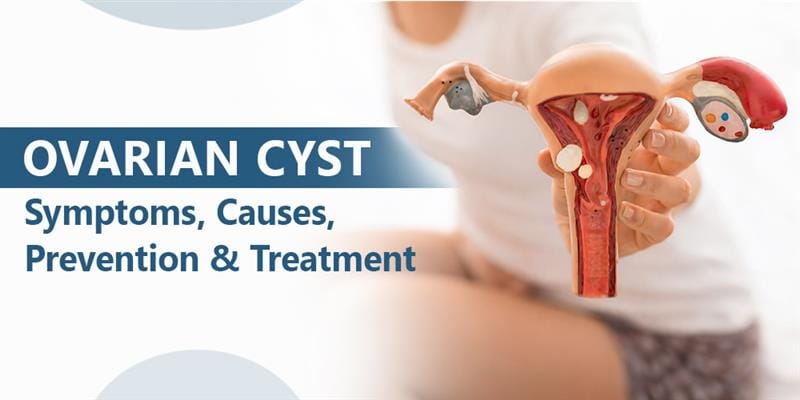If you’ve ever heard of the term Polycystic Ovary Syndrome, or PCOS, then you’re definitely not alone. It is a highly common hormonal disorder among women, yet so many times it is a daunting and confounding diagnosis. It is no rare disease, and it is not your own fault.
PCOS is a complicated disorder, but it doesn’t have to be difficult to understand. This guide elucidates the science in easy steps so that you can grasp your PCOS symptoms and treatments. We will reveal to you exactly how doctors diagnose it, what are the best things to do to improve, and how to select the best PCOS doctor in Jaipur to lead you through.
What Exactly is PCOS? (The Simple Explanation)
Visualize your body hormones as a delicate orchestra. When you have polycystic ovary syndrome, players are a tiny bit off-key.
PCOS happens when your ovaries make just a little extra androgen excess (sometimes called ‘male hormones’) than is typical. This disrupts your normal cycle so that your eggs mature into small fluid-filled sacs (follicles) that show up as a ‘string of pearls’ on an ultrasound test, instead of shedding a mature egg every month.
The principal actors responsible for this hormonal pandemonium are:
Hormone Imbalance: Your ovaries are producing androgens in excess, which is responsible directly for most of your physical symptoms such as acne and hair growing.
Insulin Resistance: This is usually behind it all. Your cells do not effectively heed the hormone insulin (the regulator of energy), so your body will produce more. That high insulin in turn instructs your ovaries to produce more androgens, and a vicious cycle is formed. Insulin resistance is the key to understanding your plan of treatment.
You should realize that PCOS is a bodywide disorder and not just an ovarian disorder. PCOS is a metabolic disorder that deals with how your body handles its energy and hormones.
Spotting the Signs: Common PCOS Symptoms in Women
Because PCOS works differently on hormones in every individual, your symptoms might appear significantly differently from someone else. These are, however, most of the most typical signs that indicate you might have to be treated for PCOS:
1. Cycle Chaos: Missing or Irregular Periods
- Irregular or Missing Periods: This is the most predictive symptom. When you have no period for months in a row, or when your periods are completely unpredictable, your body is not ovulating regularly. This is what results in inability to conceive when PCOS is present.
- Bleeding Heavily: When a menstrual cycle is finally experienced, a backlog of months of linings will result in heavier than usual flow.
2. Visible Changes from Androgen Excess
- Excessive hair growth (Hirsutism): Beard hair, chin hair, upper lip hair, or lower abdomen hair.
- Stubborn Acne: Intense and repeated outbreaks, especially near the jawline and the underside of the chin, that won’t respond to regular skincareroutines.
- Thinning Scalp Hair: Baldness or visible thinning of hair on top of the scalp (male-pattern baldness).
3. Weight and Energy Issues
- Problem in Weight Loss: Women suffering from polycystic ovary syndrome will discover that it is quite challenging to reduce those excess pounds, particularly that annoying belly fat, despite eating diets and exercising as much as possible. This is a direct consequence of insulin resistance.
- Dark Skin Patches (Acanthosis Nigricans): Thick, black-appearing skin in folds of the neck, armpit(s) or groin. This is a large red flag indicating high insulin levels.
How Doctors Figure It Out: The PCOS Diagnosis Process
The most important step towards recovery is a diagnosis. It is easy to do, but it requires a close look into your health history along with a set of simple tests.
A physician will typically make a diagnosis of polycystic ovary syndrome if you have two or more of the following three criteria:
- Irregular or Missing Periods: Symptoms that you are ovulating infrequently or not at all.
- High Androgen Levels: Symptoms of androgen excess confirmed either by the physical signs that you present (hirsutism, acne) or by a blood test to confirm high levels of some of these hormones.
- Polycystic Ovaries: An ultrasound will show the characteristic “string of pearls” appearance of an ovary or your ovaries.
What Tests You Can Expect
- Blood Tests: These test your hormone levels (androgens, LH, FSH) and check you for other problems (such as thyroid disease). Importantly, they will also test your blood sugar and insulin to determine how effectively your body is dealing with sugar.
- Pelvic Ultrasound: This quick, painless scan confirms the appearance of your ovaries and rules out other conditions.
PCOS (Polycystic Ovary Syndrome) cannot be cured permanently by anything, yet long-term treatment can significantly reduce its symptoms and long-term health. Treatment is most effective when done holistically—treating hormone imbalance, insulin resistance, and those symptoms that affect daily living.
1. Diet and Lifestyle – Basics
Dietary changes are the best PCOS treatment that strikes at the root of the problem: insulin resistance. A PCOS-promoting diet is all about low-glycemic index ingredients like oats, brown rice, lean proteins, and healthy oils to regularize blood sugar and suppress androgen production. Combined exercise and diet assist to raise insulin sensitivity as well as assist in weight control.
2. Medications – Designed to Your Specification When the symptoms persist, medicine treats specific problems:
- Irregular periods and high androgens: BCPs normalize cycles and lower androgen production.
- Insulin resistance: Metformin improves insulin use, restores ovulation, and aids in weight loss.
- Acne & excess hair: Anti-androgens such as spironolactone suppress androgen activities on hair & skin.
3. Fertility Treatment
For would-be parents, the concern is ovulation. Primary treatments are Clomiphene or Letrozole to induce the release of eggs. When this does not work, physicians may prescribe laparoscopic ovarian drilling (LOD) as a minor operation to normalize function. When cases are complicated, IVF will have the greatest likelihood of succeeding in pregnancy. In short, PCOS is never treated the same. PCOS is effectively manageable when lifestyle changes, medicine, and fertility support are all balanced just right.
Finding Local Care: PCOS Treatment in Jaipur
A professional skilled in treating polycystic ovary syndrome is what matters most. When you search PCOS treatment near me, you need a gynecologist rather than a “PCOS guide.”
Why You Need a PCOS Specialist
A general gynecologist in Jaipur will treat most women-related problems, but a specialist will appreciate the metabolic disorders and a team approach required. PCOS specialist in Jaipur is best when they coordinate efforts with dietitians, dermatologists, and reproductive specialists to provide complete care.
When seeking PCOS treatment in Jaipur, prioritize a clinic known for:
- Holistic Plans: They treat diet and lifestyle prior to medicine.
- Current Knowledge: They have an understanding of current work on insulin sensitisers and treatments of infertility.
Long-Term Management and Your Health
You have to regularly manage PCOS because it impacts your likelihood of developing long-term problems. Managing PCOS as a symptom is about avoiding long-term problems such as Type 2 Diabetes and cardiovascular disease.
Since PCOS is more probable to bring about metabolic syndrome PCOS (group of disorders such as high blood pressure and irregular cholesterol), your physician will monitor your blood sugar and cholesterol annually. This regular monitoring is included in your long-term health. If you do happen to get pregnant, this disorder also necessitates particular prenatal care to avert challenges such as gestational diabetes.
Conclusion
PCOS is a complex journey, but you do not have to go it alone. Understanding PCOS treatments and symptoms helps you to empower yourself. Good control is all about obtaining just the right fit for you as a body, and it starts through expert guidance.
If you’re faced with PCOS symptoms among women or want a full personalized plan of action, reach out to us now. Set up a consultation appointment with best doctor for PCOS in Jaipur to start on your path to balanced health. We’re ready to give you a trusted guide on your polycystic ovary syndrome journey.
Frequently Asked Questions (FAQs)
1. Will the best treatment for PCOS make my symptoms go away completely?
The best treatment of PCOS is its control rather than a cure. Regular treatment (usually a combination of drug therapies, diet, and physical activity) will regularize your periods, clarify your complexion, and enhance your pregnancy prospects. Though the inherent predisposition persists, it is possible to have complete control of its manifestations.
2. Is there a non-pill way to deal with androgen excess and hair growth?
Yes. Attention to PCOS treatment diet and exercise is most crucial of all non-pill treatments because it lowers insulin behind the excess androgen drive. Cosmetically, your physician may also suggest topical treatments or procedures such as laser hair removal as adjuncts to your general medical care.
3. If I use PCOS treatment near me and lose weight, can my periods become regular again?
Yes. For many women, a loss of 5–10% of body weight significantly helps to correct insulin resistance. This fall in insulin automatically can lower androgens and cause your body to return to normal ovulation and normal periods. Losing that extra pound is among the most helpful of PCOS treatments that are drug-free.
4. What’s the biggest mistake people make after getting a PCOS diagnosis process?
The biggest misconception is that a pill is a quick fix. Successful PCOS treatment is a PCOS lifestyle modification commitment. Treatment with medication alone without lifestyle modification will frequently result in recurrence of symptoms when medication is discontinued. Patients most successful engage in a commitment of medication along with lifestyle modification.
5. Does finding the best doctor for PCOS in Jaipur mean I only see one kind of specialist?
No. Getting your best PCOS doctor in Jaipur usually involves getting a gynecologist to be your lead expert but to coordinate your care with others a dietitian to work with on your PCOS diet, and possibly an endocrinologist to deal with difficult hormonal or metabolic problems. Good care is a team effort.






